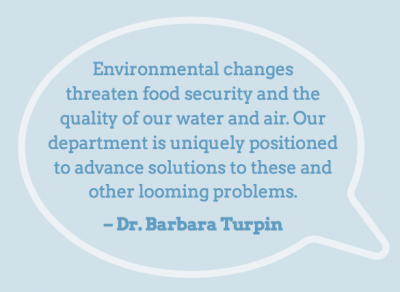Barbara J. Turpin, PhD
October 15, 2017
Barbara J. Turpin, PhD
Professor and chair, Environmental Sciences and Engineering
Q: What do you tell your students about how to prepare to be leaders in public health?
A: We – you and I – are privileged to have this opportunity to expand the frontiers of knowledge. Spreading science literacy is part of our obligation to give back. A science-literate public is essential to a functioning democracy and to public health protection. Take the time to learn how to communicate with those outside your field – and practice this skill in informal settings on a regular basis.

Q: How has your approach to leadership changed since you became a chair at the Gillings School?
A: I am quicker to ask for help from my colleagues. They appreciate being asked, and we move forward together with stronger initiatives.
Q: What characteristics are most important in public health leaders today?
A: Team-building is a vital skill for any public health leader. No matter how knowledgeable one is, an individual cannot possibly have all the expertise needed to address today’s problems. Foresight in the setting of goals is essential – as is the educational breadth and humility to recognize what expertise is needed and the skill to foster a team culture.
Carolina Public Health is a publication of the University of North Carolina at Chapel Hill Gillings School of Global Public Health. To view previous issues, please visit sph.unc.edu/cph.

